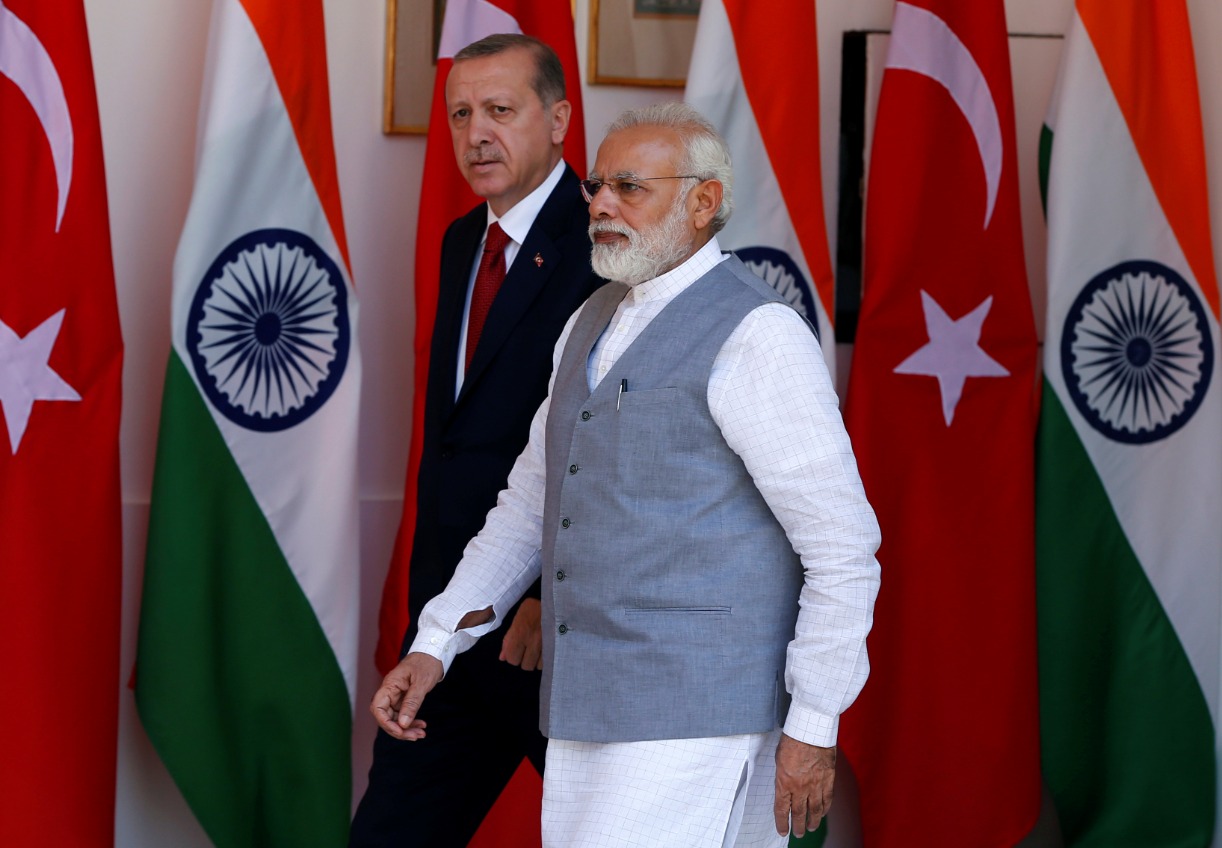Relations between India and Turkey have seen ups and downs over the years. While both countries have tried to develop stronger ties since the end of the Cold War, recent events have led to growing strains and tensions between the two nations. There are several key reasons why Turkey has adopted an anti-India stance in recent years.
Turkey’s Support for Pakistan on Kashmir
One of the main reasons for the deterioration in India-Turkey relations is Turkey’s vocal support for Pakistan’s position on the Kashmir dispute. The Kashmir region has been a major source of conflict between India and Pakistan since the partition of British India in 1947. India and Pakistan have fought multiple wars over Kashmir.
Turkey has openly backed Pakistan’s claims over Kashmir and called for the dispute to be resolved through UN intervention In contrast, India’s position is that Kashmir is an internal matter and should be resolved bilaterally with Pakistan
In recent years, Turkish President Recep Tayyip Erdogan has repeatedly raised the Kashmir issue at the UN General Assembly, much to India’s displeasure. He has criticized India’s decision to revoke Article 370, which granted special status to Jammu and Kashmir. Turkey’s endorsement of Pakistan’s stance on Kashmir is seen as hostile interference by India.
Strategic Ties Between Turkey and Pakistan
Another factor straining India-Turkey ties is the growing strategic partnership between Turkey and Pakistan. Turkey has been bolstering its defense and economic engagement with Pakistan.
In 2018, Turkey won a multibillion dollar tender to supply four corvettes to the Pakistan Navy. This was the largest defense export deal in Turkey’s history. More recently, in 2021, Turkey signed a deal to sell 30 T129 ATAK attack helicopters to Pakistan.
Turkey and Pakistan also inked a Strategic Economic Framework setting targets to increase bilateral trade to $5 billion by 2023. In February 2020, Erdogan visited Pakistan and declared Turkey’s support for Pakistan’s position on Kashmir in a joint press conference with Imran Khan.
India views Turkey’s strategic embrace of Pakistan as an unfriendly act aimed at containing India. The steady expansion in Turkey-Pakistan defense and economic ties has made India wary.
Turkey’s Neo-Ottoman Foreign Policy
Experts argue that Turkey’s stance against India needs to be seen in light of President Erdogan’s neo-Ottoman foreign policy vision Erdogan aims to restore Turkey’s prestige and influence across regions formerly under the Ottoman Empire
As part of this mission, Erdogan wants Turkey to emerge as a leader of the Islamic world Turkey has challenged Saudi Arabia’s clout and taken provocative stances on issues important to the Muslim world, like Kashmir. Erdogan calculates that championing Pakistan’s position on Kashmir will boost Turkey’s Islamic credentials
India is deeply suspicious of Erdogan’s ideological agenda and subtle Islamist leanings. His repeated comments about alleged Indian atrocities against Muslims in Kashmir have drawn India’s ire. India sees Turkey as interfering in its internal affairs under the garb of pan-Islamic posturing.
India’s Outreach to Turkey’s Adversaries
In response to Turkey’s perceived hostility, India is strengthening ties with nations like Greece, Cyprus, Armenia and Israel that have complicated relations with Turkey.
India elevated its ties with Greece to a strategic partnership in 2022. It signed defense pacts with Greece and Cyprus. India has also supplied radars and weapons to Armenia, which has a historically adversarial relationship with Turkey.
Experts see India’s outreach to these regional rivals of Turkey as a form of retaliation designed to counterbalance Turkey’s policies. However, India maintains it is simply acting according to its own interests and threat perceptions.
In response, India is deepening ties with regional rivals of Turkey. Despite sharing old historical links, diplomatic tensions and strategic divergences have driven India and Turkey apart in recent years. Managing this relationship will remain a key diplomatic challenge for both sides.

Reading

Turkish President Recep Tayyip Erdoğan on September 10 opposed the proposed India-Middle East-Europe Economic Corridor, saying that it should not bypass Turkey.
This was not surprising considering that many of the project’s possible beneficiaries such as Greece are long-standing Turkish adversaries. Significantly, Turkey’s relations with India have deteriorated in recent years over Erdoğan’s stance on Kashmir and support for Pakistan.
Meanwhile, India’s ties with adversaries of Turkey, especially in the eastern Mediterranean, have strengthened rapidly. While one view is that this Indian outreach can be a counter to Ankara’s approach, another is that it does not necessarily mean these nations are joining forces against Turkey.
Erdoğan expressed his opposition to the India-Middle East-Europe Economic Corridor a day after the project was unveiled by some of the participating nations. The proposed transport and connectivity corridor is aimed at boosting economic integration across these regions. “We say that there is no corridor without Turkey,” Erdoğan said. “Turkey is an important production and trade base. The most convenient line for traffic from east to west has to pass through Turkey.”
Turkey’s opposition to this project was not unexpected. The country straddling continental Europe and Asia has complicated ties with several nations that are expected to benefit from this project.
Cyprus and Greece are Turkey’s long-time adversaries. Greek-Turkish relations have been historically hostile and consistently tested by territorial disputes and contestations over the Aegean Sea. They also back opposing sides in a dispute that has divided Cyprus on ethnic lines. Ankara supports the Turkish Cypriots who control the northern part of the island nation and Athens supports the Greek Cypriots in the south.

Why Turkey Hates India and Loves Pakistan? Turkey Vs India | UPSC Mains GS2 IR
FAQ
Is Turkey Indian friendly?
Why is Turkey not popular in India?
Who is more powerful, Turkey or India?
Is Turkey safe to travel India?
